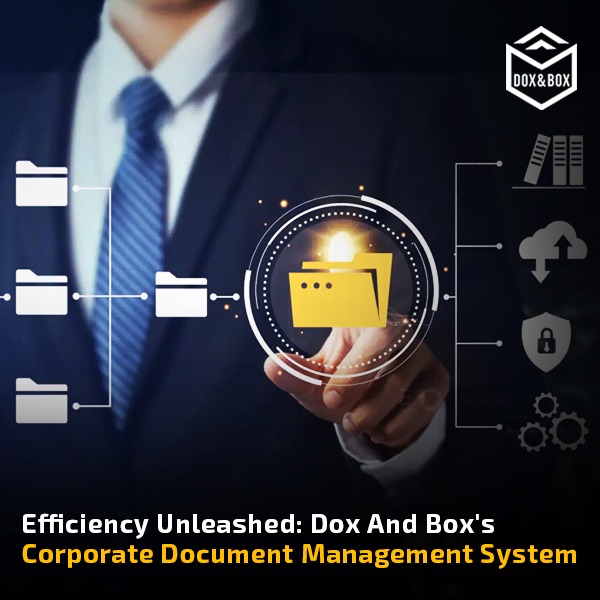The Importance of Secure Data Destruction for Law Firms
Dec 03, 2024

31
Jan
In today’s digital landscape, companies suffer enormous losses due to manual document processing in terms of operating expenses, storage needs, lost paperwork, time, and effort. This is where Dox and Box come into play. However, before we begin the blog, it is important to understand what a DMS is and how it works. Document management systems (DMS) are software that are used by enterprises to efficiently manage their document management strategies to reduce these physical document expenses. They do this by digitising critical records for storage, retrieval, and destruction. These digital documents can be uploaded on a cloud server for enhanced accessibility. However, corporate document management systems are a bit complex.
Corporate document management, or CDM, helps organisations retain certain documents in a single platform so that they can be retrieved quickly for compliance or knowledge sharing among employees. By implementing a concise document management plan, businesses can employ more efficient workflow processes, enable faster dissemination of information, instil a ‘self-service’ learning culture, and improve transparency in all facets of operations. At its core, a corporate document management system reduces operational costs associated with the need for physical storage while also reducing the time and effort required to retrieve data.
Organisations across industries rely on documents to facilitate their workflow. However, studies show a considerable loss of productivity simply because of document search and retrieval issues. Today’s workforce expects organisations to make data available on electronic devices so that they can work on the go or from an off-site location. In fact, employees believe they need to access corporate data on their mobile devices. Organisations that rely on using physical paper fail to meet these expectations, making it harder for newer generations of the workforce to be at their most productive. Moreover, organisations handling sensitive customer data naturally prohibit using file-sharing apps and personal devices.
Furthermore, a document management system like Dox and Box offers the perfect in-between – it lets leadership rest easy regarding data safety while allowing employees to access documents virtually. With remote working becoming the norm, organisations must identify an effective means to share crucial documents without opening themselves to the risk of cyber-attacks. Most enterprise document management systems use complex security protocols to ensure the safety of your data at all times. Whilst identifying the right document management system for your needs, you must first identify the mode of operation that suits you. Typically, corporate document management system has two main operational variants:
While most organisations have identified the need for corporate document management, the challenge now lies in identifying the right system for your business. The software you choose should have the following features:
As stated earlier, the majority of the employees find it challenging to find the right document due to classification or labelling errors. Dox and Box helps standardise document classification by auto-generating metadata once documents are made. Shifting the onus of accurate naming from the employee to the software can reduce human errors and the loss of time due to the same.
Finding the right document should be as simple as possible. The software should allow employees to search via keywords and display related results to facilitate quicker search and retrievals.
Most of the employees lose time retrieving the right version of the document. A good corporate document management system is one that not only allows employees to edit and update documents but also does so in a manner that displays updated versions first. It’s important to note that the system should also allow employees to retrieve older versions of a document if required.
The records and document management system should also facilitate sharing data in-house with clients and stakeholders.
Finally, the corporate document management system should leverage the latest security tools and software to ensure that only the intended users can access vital data.
These base features can allow organisations to meet their most demanding needs pertaining to storing, retrieving, editing, sharing, and deleting documents. The software you choose should be further customizable to meet any additional needs.
Corporate document management is a strategy that applies to almost all industries as it facilitates a more optimised workflow. However, many companies that rely on customer service utilise customer service scripts to ensure that all calls are attended to with the same efficiency and professionalism. These call centre scripts are updated regularly as managers review recorded calls and identify better customer satisfaction strategies. Accessing customer service scripts for different scenarios is much easier with an efficient document management system. Such systems can help save time and guarantee access to updated files instead of older, outdated ones. Thus, it’s safe to say that corporate document management systems have endless applications for organisations across different industries that must offer robust customer service. Every organisation relies on documented data in different forms and can benefit from implementing an organised system for all its documents.
A corporate document management system helps organisations improve productivity, workflow, and talent retention because satisfied, engaged employees are more likely to stay loyal to the organisation. With endless merits associated with using Dox and Box’s document management system, it’s imperative to identify when and how you should start switching from physical paper management to digitised software. Moreover, you can get in touch with Dox and Box if you’re looking for a document management system in Chennai or anywhere else in India!
